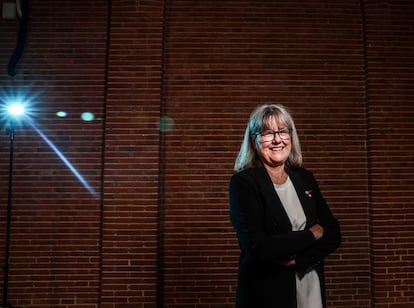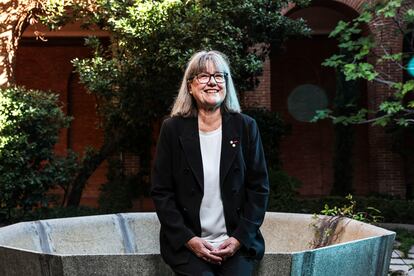Nobel laureate Donna Strickland: ‘It’s hard to see the thread from Einstein’s equations all the way to GPS’
Good science can be done anywhere with the right objective, says the third woman in history to win the physics prize

Canadian-born Donna Strickland won the Nobel Prize for Physics in 2018 for work she began in 1985 that has improved the eyesight of millions of people around the world. The technique she developed at age 26 years with her thesis supervisor, Gérard Mourou, was called Chirped Pulse Amplification (CPA) and soon became the standard for the high-intensity lasers commonly used to correct myopia. Strickland says she wasn’t seeking a specific application, but wanted to demonstrate the enormous potential of manipulating light to act on matter.
Strickland became the third woman to receive the Nobel Prize for Physics, after previous winners Marie Curie in 1903 (for her study of radioactivity) and Maria Goeppert-Mayer in 1963 (for her work on the internal structure of the nucleus of atoms). Regarding Goeppert-Mayer, Strickland admits, “I didn’t even know she was a woman” when she cited Goeppert-Mayer in her thesis.
Strickland doesn’t think that the advances in physics made by white men who dominated the field should be discounted, but she does believe that the unpredictable nature of scientific discovery makes it important “not to limit access to science to half of the world, because you’ll miss opportunities to find those unexpected gems. Everybody should be judged based on their ability to do something, not something external to that… The more people you allow at the table, the better off you are.” EL PAÍS interviewed Strickland at the Madrid headquarters of the Spanish National Research Council (CSIC), which awarded her its highest distinction — the Gold Medal.
Question. How do you keep motivated with your research after winning the Nobel Prize, the pinnacle of scientific achievement?
Answer. I wasn’t ready for the award, and it changed my life. I have probably been distracted from my research, I have left my students alone in the laboratory perhaps more than I should, but I’m also the third woman to win a Nobel in physics, so I have been invited to speak and travel a lot, even more than some men. I feel responsible for telling the public about the importance of science. I made my mark on science, and now I’m a public figure who promotes it.
Q. Do you have a scientific project that you would like to complete?
A. I still like playing with lasers. Ironically, the week before I received the Nobel for CPA, I gave up all my CPA lasers and switched to another type of fiber laser. That was new to me and I had fun learning. I have also been invited by a colleague, Toshi Tajima, who is the inventor of laser acceleration, to work on a project to accelerate electrons with which we can endoscopically reach a tumor and eradicate it completely, so surgeons can avoid cutting too deep.
Q. A few centuries ago, we lived in a world in which everyone more or less understood the technologies of their daily lives. Now we are very far from understanding the most basic technologies we use, such as lasers. What can we do to better understand the world we live in?
A. I think that not even scientists fully understand everything about their own fields, but it’s not about knowing everything. It’s more important for the public to understand the scientific process. Understand that we have to do fundamental research so that the next generation can develop new techniques.
During the pandemic, people wondered why there wasn’t a vaccine, and then they thought that the vaccine had been developed too quickly and wasn’t reliable. But people didn’t know that people had been working for decades on the concept of messenger RNA and on all the ideas that make vaccines possible. That enabled the development of a Covid-19 vaccine in one year, which blew most of our minds.
If people understood the process and that many, many people around the world were working on it — not just one person — I think they would have more confidence. And I think this is more important than necessarily knowing how each type of science works. I think they have to understand the whole process and see that we all learn from each other and learn from our mistakes. That was the other thing about Covid that made people so upset. Should we wear masks or not? It was a science experiment unfolding right in front of them. And we didn’t know whether it was spread by droplets or aerosolized. And so, you know, we learned more with each step and changed some ideas. And for scientists, we were okay with that.

Q. When it comes to trusting in science, we are witnessing a rise in irrelevant publications, researchers churning out hundreds of articles annually that add no value, and fraudulent scientists who manage to garner high citation rates.
A. It’s unfortunate. We need to reassess our approach to science. We have to step back and find different ways of saying what makes a good scientist. These cases are still uncommon but receive excessive attention due to our fascination with negativity. I’d like to emphasize that in some instances, colleagues themselves recognized problems and withdrew their own articles. We do self-regulate. Nevertheless, we must strive for improvement and discard the notion that publishing or achieving citations in specific journals is the sole measure of success.
This just did not happen in my day. We had to go to a library and look up this big, thick book to find out if we were cited or not. So you can go back and look — there are very few references at the end of each paper. We didn’t worry about how much we were cited. Because of this digital age, it’s so easy to judge by numbers. I can quickly look up how many papers, how many good papers, what’s the impact factor, what’s the citation record. And so it’s too easy to judge that way. And we’ve all jumped on it. I hope we start looking at ourselves and say we need a better way to judge.
Q. Science today is highly competitive and demands significant financial resources and exceptional talent from around the globe. As a result, the most competitive scientific work predominantly takes place in a few select locations worldwide.
A. I don’t think that’s true. I think you can get good science everywhere. And I think this is what my Nobel Prize really shows. I didn’t publish in any high impact journals. I didn’t publish a big, long paper. I agree, of course, that some places have a lot of money, and they can attract top people, which attracts top students. And so having all of that brain power can help more things happen. But I hope we don’t lose the ability to fund everyone.
Q. Coming from a relatively small institution like the University of Waterloo in Canada, and a country with a population similar to Spain, you’ve achieved remarkable success. I’d love to hear your advice for a medium-sized country like Spain, with limited resources. How can we determine which type of research to prioritize for meaningful outcomes?
A. The question is: what does it mean to be really meaningful? Many people make the mistake of thinking that research needs to have immediate practical applications within a few years. This leads to a focus on applied research, which limits the exploration of new fundamental ideas. Take, for example, the development of GPS, which required a deep understanding of general relativity. It’s hard to see that thread from the very fundamental, like Einstein’s equations, to finally having GPS.
We need to advocate for the importance of conducting basic research to our governments. It’s also crucial to recognize that not everyone can jump on the quantum physics or artificial intelligence bandwagon. We can’t all jump on what’s big and cool because we might miss all those little gems that are out there. Let’s allow the larger countries to focus on the big things, while the smaller ones explore the great advancements that can emerge anywhere.
South Korea transformed from a poor to a rich country by investing heavily in science. I hope countries like Spain and Canada take note of this example. After the Korean War in the 1950s, they were extremely impoverished. However, they now boast major companies like Samsung, thanks to their investment of nearly 5% of their GDP in R&D. As they continue to grow, they understand that R&D fuels economic expansion. They focus on both applied and basic research, with a long-term plan in mind, rather than just short-term thinking.
Q. Pope Francis recently asked you to join the Pontifical Academy of Sciences in the Vatican. Here, you will be working alongside Jennifer Doudna and Emmanuelle Charpentier, Nobel Prize winners for their groundbreaking research on the CRISPR gene editing system. What will your role be in this institution?
A. The Vatican aims to understand science inclusively, seeking diverse perspectives from around the world, including women and people outside of Europe. Being Catholic is not a requirement — I’m not. The pope shows genuine concern for the environment and acknowledges the church’s social responsibility to prioritize ethical scientific endeavors.
Q. Does science, particularly the understanding of the physical foundations of the world, give meaning to your life? Or do you seek that elsewhere?
A. To me, they are completely separate. Our cottage faces west, and we enjoy breathtaking sunsets over a large lake. As an optics expert, I understand the science behind the red color of the sun when it sets and the blue color of the sky due to light scattering by clouds. I grasp everything from an optical standpoint. But every night when I see the beautiful sunset, I still put out my thank you to God for letting us live in a beautiful universe. So to me, it’s two separate things.
Sign up for our weekly newsletter to get more English-language news coverage from EL PAÍS USA Edition
Tu suscripción se está usando en otro dispositivo
¿Quieres añadir otro usuario a tu suscripción?
Si continúas leyendo en este dispositivo, no se podrá leer en el otro.
FlechaTu suscripción se está usando en otro dispositivo y solo puedes acceder a EL PAÍS desde un dispositivo a la vez.
Si quieres compartir tu cuenta, cambia tu suscripción a la modalidad Premium, así podrás añadir otro usuario. Cada uno accederá con su propia cuenta de email, lo que os permitirá personalizar vuestra experiencia en EL PAÍS.
¿Tienes una suscripción de empresa? Accede aquí para contratar más cuentas.
En el caso de no saber quién está usando tu cuenta, te recomendamos cambiar tu contraseña aquí.
Si decides continuar compartiendo tu cuenta, este mensaje se mostrará en tu dispositivo y en el de la otra persona que está usando tu cuenta de forma indefinida, afectando a tu experiencia de lectura. Puedes consultar aquí los términos y condiciones de la suscripción digital.









































